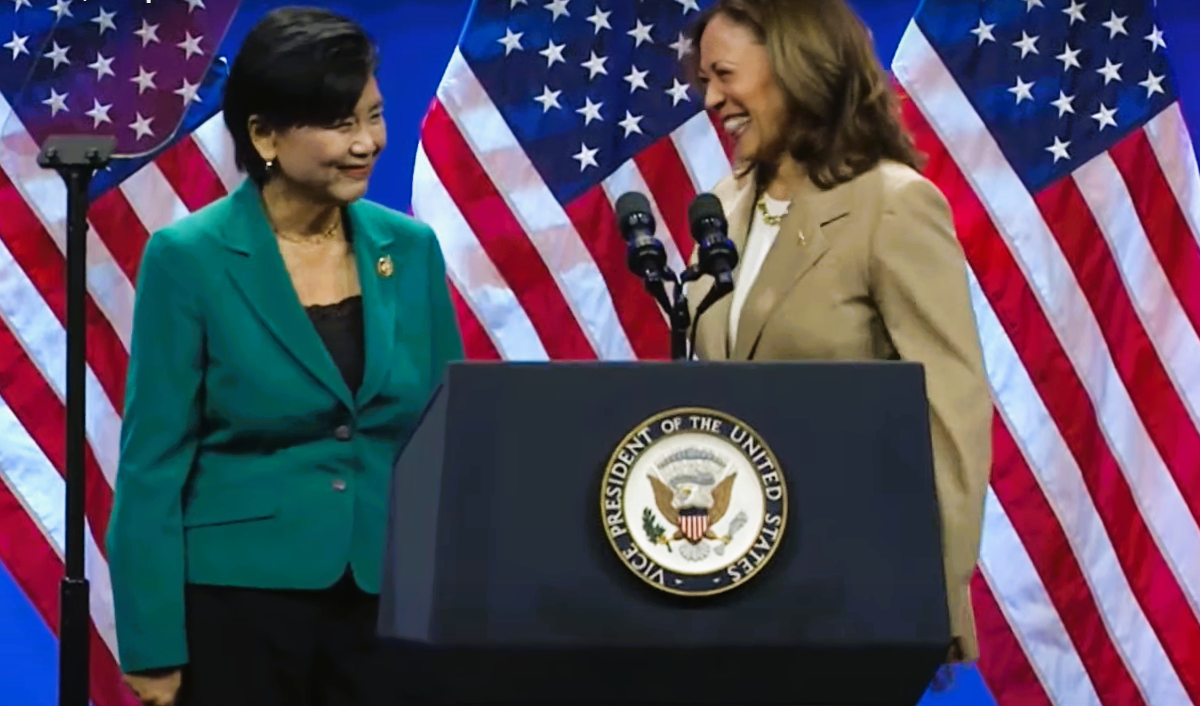Vice President Kamala Harris gave the keynote address at the APIA Presidential Town Hall July 13 in Philadelphia, Pennsylvania, fiercely exhorting that Republican Presidential nominee Donald Trump should never again serve at the White House.
The Town Hall was attended by at least 1100 Asian American Pacific Islander elected leaders and office seekers, as well as many community advocates. APIAVote has held the Presidential Town Hall in every election year since 2008. Past speakers have included Barack Obama, Hillary Clinton, and Joe Biden, among others, when they were candidates.
More than 15 million AANHPIs will be eligible to vote in the Nov. 5 election.
The Trump Factor
Sen. Mazie Hirono, the first AAPI woman to be elected to the Senate, gave a fiery speech in her amusing style of dropping expletives throughout. Reps. Judy Chu, chair of the Congressional Asian Pacific American Caucus, Ted Lieu, believed by many to be a future House Speaker, and Jill Tokuda also addressed the gathering.
Trump was invited by APIAVote to speak at the event, but instead held his own rally in Butler, Pennsylvania, at which he was shot in an apparent assassination attempt. The former President survived the incident as a bullet grazed his ear, and is currently attending the Republican National Convention in Milwaukee, Wisconsin.
In the three weeks following a disastrous debate performance June 27, President Joe Biden has faced a chorus of calls from Democrats urging him to step down from the race, and allow Harris to lead the ticket. The president has fought back and vowed to stay in the race. Harris has said publicly that she supports that choice.
Favorability
“He is a fighter. And he is the first to say, when you get knocked down, you get right back up. So, we will continue to fight. We will continue to organize. And in November, we will win,” she said.
Harris’ favorability among Asian Americans is surprisingly low. In a new poll released last week by AAPI Data, just 13% said they viewed the potential Presidential candidate favorably, while 31% viewed her somewhat favorably. 42% of Asian Americans surveyed said they viewed Harris unfavorably.
If the election were being held today, 46% of Asian American voters surveyed said they would be inclined to vote for Joe Biden, versus 31% who would vote for Donald Trump, according to survey results from AAPI Data. In a major shift however, nearly one in four respondents said they would vote for a third party candidate, or remain undecided.
Repealing the ACA
“This is the most existential, consequential, and important election of our lifetime,” said Harris. “Someone who vilifies immigrants, who promotes xenophobia, who stokes hate, and who incites fear should never again have the chance to stand behind a microphone and never again have the chance to stand behind the seal of the President of the United States of America. There is so much at stake in this moment.”
While in office, Trump attempted to repeal the Affordable Care Act more than 60 times and to give insurance companies the power once again to deny people with pre-existing conditions.
“Remember what that was like? What that meant for people with pre-existing conditions? Children with asthma? Women who survived breast cancer? Grandparents with diabetes? We cannot forget,” said Harris.
Urban Inequities
In 2020, the Brookings Institute released a report, listing six ways in which Trump had negatively impacted the ACA.
“President Biden and I on the other hand have defended the Affordable Care Act and made it stronger. Because we believe health care should be a right and not just a privilege for those who can afford it,” said Harris. She noted that the Administration has successfully capped the cost of insulin to $35 for seniors, and expunged medical debt from credit reports.
The Biden-Harris administration has also addressed several decades-long urban inequities, such as an expressway in Philadelphia’s Chinatown, which has largely cut off its residents. The vice president noted that $160 million has been allocated to create walking and bike paths and greenscapes so that Chinatown residents can return to jobs, schools, and churches.
Data Disaggregation
Missing from the remarks of speakers at the Presidential Town Hall was a vision for the Biden-Harris administration’s next four years. Harris dismissed one of the most critical issues of the 2024 race — abortion rights — saying only that if Congress passes a measure to protect reproductive choice, the president would sign the bill.
Speakers discussed the Administration’s past laurels, including a bill to combat hate crimes, and a landmark data disaggregation initiative. Largely left out of the afternoon’s remarks was the Administration’s significant action on climate change, and a $454 billion infrastructure bill, which is creating 15 million new jobs, including more than 800,000 new manufacturing jobs.
A Seat at the Table
“America is at a crossroads, and right now it needs the leadership of us to help see its way forward,” said Tokuda, a Democrat from Hawaii.
“The AANHPI community has arrived. We will not be disrespected. And come this November, hear us roar,” said Lieu, a Democrat from California.
Chu, also a Democrat from California, noted there are currently 22 AANHPI members of Congress and 77 CAPAC members. “This is a historic high. Because we have a seat at the table, we’ve pushed for the rights and needs of our communities,” she said. “AANHPIs have truly gone from being marginalized to being the margin of victory.”




